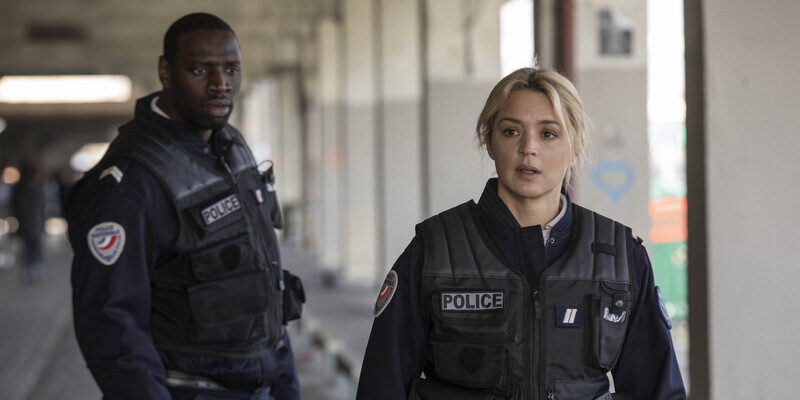
Three Parisian cops face a moral dilemma when tasked with escorting a
political refugee to the airport for deportation.
Review by
Eric Hillis
Directed by: Anne Fontaine
Starring: Omar Sy, Virginie Efira, Grégory Gadebois, Payman Maadi

Since arriving on the scene in the mid-90s, French writer/director
Anne Fontaine has never been out of work, delivering movies at a
rate close to one per year. That's likely because she makes the sort of
middlebrow films (Gemma Bovery,
The Innocents,
Reinventing Marvin) that are relatively easy to get financed. While she's clearly
talented, Fontaine largely specialises in the sort of movies that leave
you thinking "It was fine, I guess." With police drama
Night Shift, she's finally made a movie with some bite, even if it does get bogged
down by unnecessary subplots in points.
Adapting a novel by Hugo Boris, Fontaine takes the setup of Hal
Ashby's The Last Detail - in which a pair of military
policemen are tasked with bringing a young AWOL soldier to face charges,
and grow to empathise with him along the way – and reworks it to tackle
the moral minefield of refugee deportations.

In Rashomon style, we're introduced to three Parisian
cops in the opening act, which details a seemingly humdrum day from each
of their perspectives. Virginie (Virginie Efira) appears to have
a troubled home life, her husband accusing her of neglecting her family
thanks to her job. Aristide (Omar Sy) is a boorish, happy go
lucky type, and doesn't so much as break a sweat when Virginie reveals
that she's carrying his child and is set for an abortion the following
morning. The middle-aged Erik (Grégory Gadebois) seems to be
using his job to escape from his own doomed marriage, and is desperately
trying to stay off the booze and cigarettes.
The three cops find themselves thrown together on an assignment to
escort political refugee Tohirov (Payman Maadi) from an asylum
centre to Charles De Gaulle airport, where he will be deported back to
Tajikistan. At the centre they're stopped by an activist who pleads with
the cops to delay Tohirov's flight, as the European Court is about to
rule in favour of him remaining in France in the next couple of days.
The cops brush her off with jobsworth dedication to the badge, but when
Virginie reads Tohirov's file she realises that they may be sending him
home to face execution. Can she convince Aristide and Erik that the
right thing to do is let Tohirov "escape" before they reach the airport
and seal his fate?

Along with The Last Detail, Night Shift takes a cue from 12 Angry Men, as Virginie attempts to win her colleagues over to her side. She's
the most liberal minded of the three, whereas Erik dismisses Tohirov as
"probably a terrorist." Aristide is apolitical, and seen as an easier
convert to Virginie's cause than the stuck in his ways Erik.
Structurally, it recalls yet another movie, William Friedkin's
Sorcerer, in how it spends its first act establishing three characters before
putting them inside a vehicle for the main narrative. It's arguable that
the first act of Sorcerer is largely pointless, and that
the backstories of its protagonists have no essential bearing on what is
a Wages of Fear remake, but I've always found those
opening segments more engaging than the truck-bound thriller that
follows.
In the case of Night Shift I'm on the other side of the
fence. We really don't need so much time devoted to the lives of
Virginie, Aristide and Erik in the hours leading up to picking up
Tohirov, and their various personal tribulations don't thematically tie
in with the moral dilemma they're ultimately forced to tackle. Is there
any point to Virginie and Aristide having had an affair, or Erik
struggling with addiction issues? What does any of that have to do with
the fate of Tohirov? Wouldn’t it have carried more dramatic weight if
Virginie's revelation of being pregnant with Aristide's child had come
out during the car ride rather than being presented to us
beforehand?

Regardless of the arguable redundancy of Night Shift's first act, once the quartet of characters are shut inside the
vehicle, Fontaine's film takes flight. Shooting four people in a car is
notoriously difficult, but Fontaine finds just the right places to put
her camera to tell this intimate story. Rather than relying heavily on
dialogue, as you might expect from this setup, half the story is told
through glances in rear view mirrors, and in one effective sequence
Aristide runs through a series of red lights when he realises his female
colleague's plan to let their captive loose. Sy does fantastic work in
this scene. With only his eyes visible in the mirror, we can see the
trace of a smirk as Aristide is cruelly punishing Virginie. The drama is beautifully played by all four members of the assembled
quartet, with Maadi particularly impressive in a role that requires him
to convey his fear without the use of language.
There's no doubt a more nuanced version of this story to be told at
some point in the future, but in the meantime
Night Shift makes for a thoughtful and immaculately acted,
if a tad conventional, thriller.


